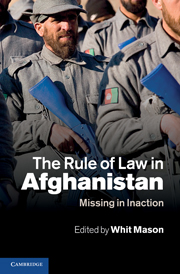Book contents
- Frontmatter
- Contents
- Contributors
- Preface and acknowledgements
- 1 Introduction
- PART I The scope and nature of the problem
- PART II The context
- PART III The political economy of opium
- PART IV Afghan approaches to security and the rule of law
- PART V International interventions
- PART VI Kandahar
- PART VII Conclusion
- 17 Axioms and unknowns
- Index
- References
17 - Axioms and unknowns
Published online by Cambridge University Press: 01 June 2011
- Frontmatter
- Contents
- Contributors
- Preface and acknowledgements
- 1 Introduction
- PART I The scope and nature of the problem
- PART II The context
- PART III The political economy of opium
- PART IV Afghan approaches to security and the rule of law
- PART V International interventions
- PART VI Kandahar
- PART VII Conclusion
- 17 Axioms and unknowns
- Index
- References
Summary
This book is going to press amid a long overdue sense of crisis over Western policies and practices in Afghanistan. In the memorable words of Donald Rumsfeld: ‘There are known knowns. These are things we know that we know. There are known unknowns. That is to say, there are things that we now know we don't know. But there are also unknown unknowns. These are things we do not know we don't know.’ Undoubtedly the same could be said for Afghanistan, and both the known unknowns and the unknown ones must keep our hopes modest even as we reflect on things we have not always known but now feel with some confidence that we do.
As the foregoing chapters make clear, much of the intervention's spectacular underperformance derives from two categories of ignorance: not understanding the link between the rule of law and security; and, even after beginning to recognise the importance of the rule of law, not knowing how to foster it. Both areas of ignorance derive, in turn, from a superficial understanding of what the rule of law means and requires in the life of a society.
Just as ‘everything is connected to everything else’ in the relationship between law and society, so too with lawlessness and its corrosive effects on that state of affairs that we call the rule of law.
- Type
- Chapter
- Information
- The Rule of Law in AfghanistanMissing in Inaction, pp. 319 - 329Publisher: Cambridge University PressPrint publication year: 2011

